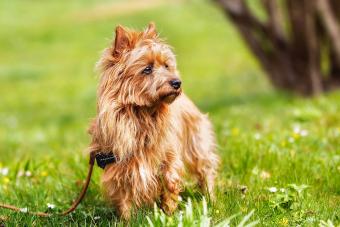
The Australian terrier is a typical terrier, and this breed loves to dig and bark. The breed is a tireless and spirited little dog with a great deal of confidence. "Aussie" terriers are excellent house dogs but may not thrive in an environment with small pets. His nature is to chase vermin and little pets, including cats.
Australian Terrier Breed Overview
This breed is the result of crosses between various terriers. These terriers were brought to Australia by British settlers in the nineteenth century. The dog was used as a ratter to control vermin populations around harbor areas, gold mines, and farms. He is happiest when around his "people."
Origin and History
This dog is bred to be small and tough! The breed incorporated other British terriers, including the cairn terrier, Yorkshire terrier, and Dandie Dinmont terrier. The Australian terrier is the first Aussie breed to be recognized and shown in his home country.
Temperament
The Aussie is a tireless and spirited little dog. The breed is a wonderful watchdog and sensitive to strangers. The Australian terrier is energetic and known to be attached to his family. Aussie terriers may enjoy being the only dog in the house as many do not like to share family members with other small pets.
Appearance
The terrier is known for his high-set erect ears and a soft, silky topknot.
- Coat color: This terrier's most common coat color is blue with tan. Other coat colors are solid red or sandy.
- Height: The Aussie terrier is up to ten inches tall.
- Weight: This little canine weighs up to 14 pounds.

The Australian Terrier Is Hypoallergenic
No canine is 100 percent hypoallergenic. With that in mind, the Aussie terrier's light shedding coat does not produce much pet dander, which is the leading cause of most pet-related allergies. This breed is a good candidate for pet parents suffering from allergies.
Grooming
Show dogs require combing and brushing at least once a week. This breed is a low-shedding breed. Pet parents need to clip the hair, which causes the fur to become softer.
Exercise
This natural ratter enjoys chasing small animals and vermin. Dog sports, including earth dog and flyball, are excellent activities for this terrier.
Health Issues
Australian terriers are generally healthy but prone to specific health conditions.
- Patellar luxation
- Legg-Perthes disease
Top Australian Terrier Mixes
There are many Aussie terrier mixes if the purebred dog is not a good candidate for your lifestyle.
- Rustralian terrier: Australian terrier and Jack Russell terrier
- Mini Australian Shepterrier: Australian terrier and miniature Australian shepherd
- Terri-Poo: Australian terrier and poodle
- Aussie Silk terrier: Australian terrier and Silky terrier
- West Australian terrier: Australian terrier and West Highland white terrier

Caring for Your Senior Aussie Terrier
The Aussie terrier's life expectancy is 15 years. This small breed lives for a long time! All small breeds need to see the vet at least twice a year and may need pain medications or supplements for achy joints.
This Aussie Breed Is One of the Smallest Working Terriers
This terrier is an excellent jumper and enjoys chasing squirrels, rabbits, and cats. Aussie terriers were bred to hunt vermin, and this instinct is still powerful. This breed may not be a good candidate for households with gerbils, rabbits, and felines.
The Aussie Is a Typical Terrier
The breed acts and behaves like every typical terrier. This small dog chases vermin to control rat populations. This Aussie terrier is a wonderful companion animal and a good fit for pet parents suffering from allergies. The Australian Terrier Club of America is a great resource for pet parents interested in the breed or puppies.







